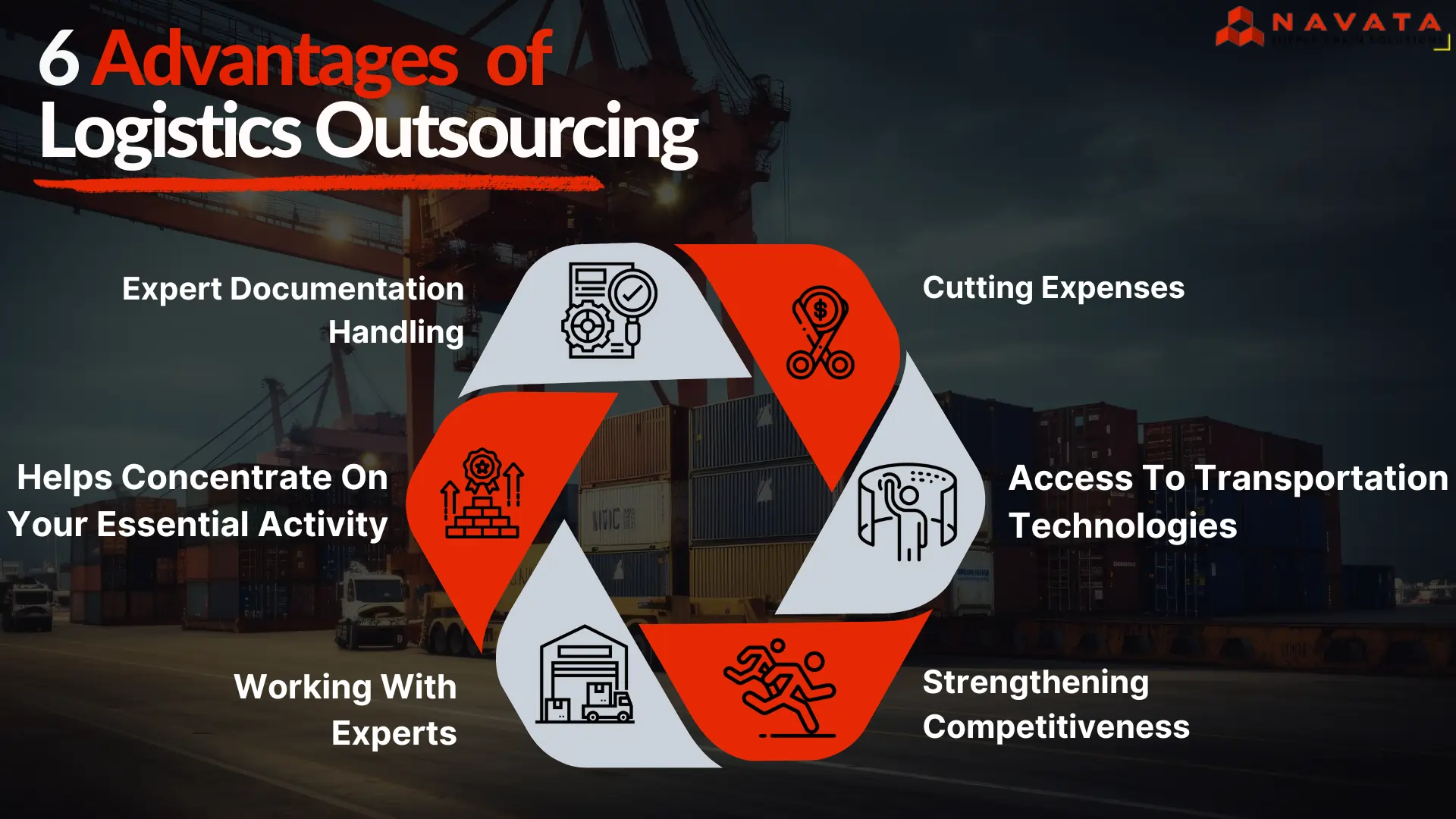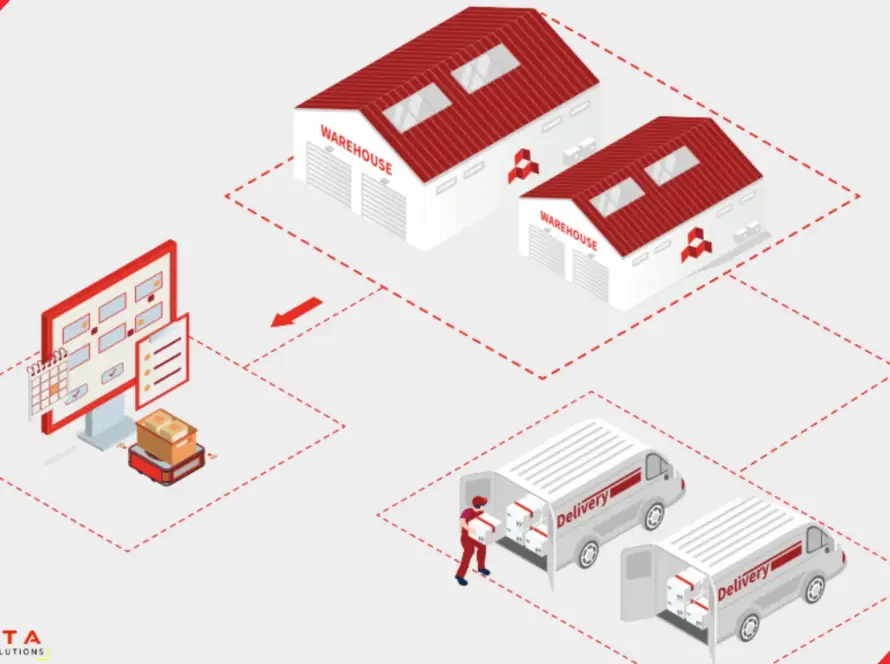Logistics Outsourcing
The act of assigning all or some logistics-related responsibilities to an outside business is known as logistics outsourcing. It also goes by the names “contract logistics” or “3PL logistics,” which denote the use of outside contractors to handle logistics tasks.
These days, logistics companies perform their services in accordance with international norms and guidelines. Class A or B warehouses are offered by 3PLs for rent or purchase. The sophisticated warehouses have state-of-the-art processing, accounting, and warehousing technologies installed. Additionally, these warehouses employ experts and trained laborers who efficiently oversee the commercial operations of their clients. The primary benefit of outsourcing logistics to a business owner is that they can avoid hiring employees, purchasing equipment, and maintaining a warehouse. A business only needs to request the services it needs, then pay the supplier when the work is completed.
Also Read: 7 Steps to Choose the Best 3PL Provider for Your Business
Advantages of Logistics Outsourcing
Selecting a reputable, seasoned workforce that will collaborate with you to guarantee accomplishment is essential if you intend to outsource your logistics. Let’s examine some pros and cons of logistics outsourcing.
Expert Documentation Handling
Accurate documentation is required to ensure that your items reach at their destination without additional delays. Noncompliance might lead to delays, and regulatory fines. Working with an experienced 3PL ensures that your documentation is completed appropriately and compliant, avoiding unnecessary risk.
Cutting Expenses
This is the second-most significant benefit of logistics outsourcing. A company does not pay for warehouse rental, does not set up a logistics department with salaries, and does not invest in equipment or consumables. It employs the logistics provider’s resources to obtain the necessary services in the required quantity.
Outsourcing allows business owners to cut overhead costs and invest in areas more critical to their success than logistics management. A logistics provider can use their network of carriers to negotiate cheaper shipping rates, lowering the cost of moving products. Logistics providers provide services such as warehousing, inventory management, and order fulfillment. This allows firms to save money on manpower, equipment, and storage space.
Access To Transportation Technologies
When e-commerce enterprises outsource to logistics providers, they gain access to cutting-edge technologies that can help them streamline operations and increase productivity. This is especially critical if the company is new and lacks in-house expertise or the resources to establish new systems.
Consider an online retailer attempting to manage several sales channels while also keeping track of inventory. It can quickly become too much to handle. Partnering with a logistics supplier is critical for ensuring efficient order fulfillment.
Helps Concentrate On Your Essential Activity
If a corporation spends a significant amount of time on non-core duties, it risks losing control of more critical concerns. There is no time to analyze the market, promote, develop, and launch new products. Logistics outsourcing frees up time for other critical and profitable tasks, hence increasing corporate efficiency and profitability.
Strengthening Competitiveness
If a company has a sudden surge or reduction in sales, outsourcing logistics to a 3PL enables swift modifications in operations to match consumer demand without sacrificing quality or service. This flexibility can help businesses remain nimble and responsive to market changes.
Furthermore, it allows enterprises to readily expand across borders, ensuring a high level of growth.
Working With Experts
Not every company can afford to establish a logistics department and engage highly qualified personnel in this industry. However, by hiring logistics providers, a company may leverage the experience of specialists and the most advanced technologies to address its logistics challenges. If your staff lacks logistics experience, it is wise to entrust this responsibility to professionals. Third-party logistics providers are equally liable for the services they deliver.

Disadvantages of Logistics Outsourcing
Loss of Control
Most third-party logistics providers use customer branding for assets and workers, thus the link is usually invisible to customers. It is still difficult to outsource your logistics operations to a third party if you are unsure of the benefits.
Your provider will be in charge of a key aspect of your customer relationships. Any service failure will be attributed to your firm rather than the outsourced provider. Contracts and service level agreements, on the other hand, can assist in addressing this issue and preventing problems from occurring.
Disconnection of Clients & Agents
A third-party logistics provider adds another layer between a corporation and its final client. Clear channels of communication must be established to avoid potential disconnects.
Strategic Misalignment
In an outsourced collaboration, both sides must grasp the strategy and the key performance indicators (KPIs) that produce value. The logistics provider may offer creative solutions and a clear competitive advantage, thus it should be regarded as a strategic partner rather than a cost.
However, the third-party provider must be willing to engage the consumer at that level and not view the relationship solely as an opportunity to enhance profits. Instead, you must become a true multi-service provider, willing to seek outside expertise to address new difficulties such as international shipping.
Risk of Information Leakage
When a corporation provides private information to a third-party contractor, it must recognize that there is always the possibility of information leaking. As in the previous example, it is critical to select a reliable logistics partner.
Additional Fees
While outsourcing is desirable to most businesses due to its low cost, there may be “pitfalls” when compared to in-house logistics development. For example, a logistics provider may stipulate an additional payment in the contract terms in small print. To avoid this issue, the contract with the logistics supplier must be concluded carefully.
Quality Control Issues
When a company relies on a logistics provider to manage its supply chain, it risks losing direct control over product quality and customer experience. This can be challenging, especially if the logistics provider does not handle inventory efficiently or does not satisfy quality standards, which can lead to undesirable results such as product faults, low stock levels, and dissatisfied consumers.
Unlock Efficiency: Outsource Your Logistics Now!
How Can You Offset The Disadvantages of Logistics Outsourcing?
- While looking for Logistic Outsourcing Choose a partner who has extensive expertise in your industry and business needs.
- Implement an effective communication plan with the team and equip them with the resources they require to execute their jobs effectively.
- Create explicit contractual agreements so that you understand how much the outsourcing provider will charge you for their services.
- Establish clear and attainable expectations to keep all parties on the same page at all times.
- Conduct regular monitoring and quality checks to identify any concerns early on and take action before they become too big to handle
Conclusion
Logistics outsourcing has many advantages, including lower costs, easier access to cutting-edge technologies, and increased competitiveness. But it also presents difficulties including losing control, possibly losing contact with customers, and information leak threats. It’s critical to select a trustworthy partner, set up efficient communication channels, draft clear contracts, define clear expectations, and carry out routine monitoring in order to lessen these drawbacks. In today’s competitive industry, logistics outsourcing may be a strategic move that drives corporate growth and optimizes operations with right strategy and execution.

Thanks For Reading: Logistic Outsourcing Pros & Cons
Powered By 360Presence
FAQ
What is logistics outsourcing?
Logistics outsourcing involves assigning logistics-related responsibilities to an external company, often referred to as “contract logistics” or “3PL logistics,” to handle tasks like warehousing, transportation, and inventory management.
What is the benefit of outsourcing logistics for business owners?
Outsourcing logistics allows business owners to avoid hiring employees, purchasing equipment, and maintaining a warehouse, reducing overhead costs and enabling them to pay only for the services needed.
How can outsourcing logistics cut expenses?
Outsourcing eliminates costs for warehouse leases, logistics department salaries, and equipment. It also uses the logistics provider’s network to negotiate lower shipping rates, which reduces overall costs.
What expertise do logistics providers offer?
Logistics providers offer highly qualified personnel and advanced technologies, leveraging their expertise to solve logistics challenges effectively, particularly beneficial for companies lacking in-house logistics experience.
Any additional fees in logistics outsourcing?
Hidden fees may arise from contract terms not fully understood, so careful examination and clear contractual agreements are necessary to avoid unexpected costs.sourcing?


1 Comment